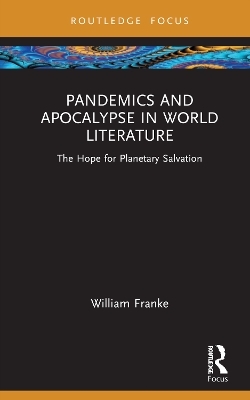
Pandemics and Apocalypse in World Literature
Routledge (Verlag)
978-1-032-89585-7 (ISBN)
- Noch nicht erschienen (ca. Januar 2025)
- Versandkostenfrei
- Auch auf Rechnung
- Artikel merken
This book rereads classical narratives of plague from the Bible (Exodus) and classical antiquity, both Greek (Homer, Thucydides, Sophocles) and Roman (Lucretius, Virgil, Ovid), through the Middle Ages (Boccaccio) and Modernity (Defoe, Manzoni, Artaud, Camus) as a basis for contemplating the significance of the recent Covid-19 pandemic. It concerns how we are to confront future pandemics and other inextricably related crises, notably those of an ecological nature. Responses to Covid-19 typically set everything on defeating this “enemy,” but actually we cannot eliminate viruses without eliminating ourselves. We need to see the pandemic as revealing us to ourselves in our inherently vulnerable condition as a first step to admitting the infinite openness to one another and to our Ground—physical and metaphysical—that alone can save our world by engendering a different attitude, open and engaged, to one another and to the Earth as sources of our collective life.
William Franke is Professor of Comparative Literature at Vanderbilt University. He is currently Francesco de Dombrowski Professor in Residence at the Harvard University Center for Renaissance Studies in Florence (Villa I Tatti) and Senior Fellow of the International Institute for Hermeneutics. He has been Research Fellow of the Alexander von Humboldt-Stiftung, Professor of Philosophy at the University of Macao, Visiting Professor of Philosophy at the University of Navarra, and Fulbright Distinguished Chair in Intercultural Theology and the Study of Religions at the University of Salzburg. His books include On What Cannot Be Said (2007); Poetry and Apocalypse (2009); Dante and the Sense of Transgression (2013); A Philosophy of the Unsayable (2014); The Revelation of Imagination (2015); Secular Scriptures (2016); A Theology of Literature (2018); The Universality of What is Not (2020); The Divine Vision of Dante’s Paradiso (2021); The Vita Nuova and the New Testament (2021); Dantologies (2024); and numerous others.
List of Illustrations
1. Prologue and Acknowledgments
Part I. Plague Literature
2. The Engendering of Hope from Human Helplessness
3. Myth, History, Fiction, and the Limits of Representation
4. The Mystery of the Supernatural at the Limit of Naturalism
5. From Ambiguity of Causes to Moral Certitude through Existential Conversion
6. Securing Control versus Acknowledging Grace and Vulnerability
7. Hope in a Negative Theological and Apocalyptic-Fictive Register of Wholeness
8. Theology of Hope as Negative Theology—Moltmann and Bloch
9. Partial Action Combined with Hope in Wholeness
10. Othering Hope: Postmodern, Extra-European, and Indigenous Perspectives
11. The Vision of the Whole versus Parceled Perception
Part II. Political Ecology
12. The Web of Connections: Integral Ecology, Culture, and Society
13. Pandemics and Environmental Apocalypse: Their Common Causes
14. Progressive versus Apocalyptic Perspectives on Pandemics
15. Hope in Civil Society between Private and Public
16. From Social to Cosmic Consciousness: Latour’s Apocalyptic Reading of the Coronavirus Crisis
17. Relativizing Scientific “Truth”
18. Truth and Transcendence versus Technique
19. Negative Theology of the Earth According to Bruno Latour
Part III. Apocalyptic Hope
20. Eschatology, Incarnation, Kenosis
21. Indigenous Salvation as Guide
22. From “Theology of Hope” to “Theology of the Earth”
23. Science, Faith, and Social Belief—Not Strictly Separable
24. Control and Excess in Dissembling the Unspeakable
25. Parallel Perspectives and the Novel
26. A Semiotic Model of Contagion—Viral Informatics
27. Hoping Against Hope. From Reason to Religion, or Spiritualizing Rationality
28. Conclusion: Hope-fail Enactment of Eternity
29. Coda: Plague and War
30. Appendix: Abstracts of Selected Plague Narratives in Literature, Classical to Modern
Bibliography
Index
| Erscheint lt. Verlag | 21.1.2025 |
|---|---|
| Reihe/Serie | Routledge Focus on Literature |
| Zusatzinfo | 6 Halftones, black and white; 6 Illustrations, black and white |
| Verlagsort | London |
| Sprache | englisch |
| Maße | 138 x 216 mm |
| Themenwelt | Literatur ► Fantasy / Science Fiction ► Science Fiction |
| Geisteswissenschaften ► Sprach- / Literaturwissenschaft ► Anglistik / Amerikanistik | |
| Geisteswissenschaften ► Sprach- / Literaturwissenschaft ► Literaturwissenschaft | |
| Studium ► Querschnittsbereiche ► Prävention / Gesundheitsförderung | |
| ISBN-10 | 1-032-89585-3 / 1032895853 |
| ISBN-13 | 978-1-032-89585-7 / 9781032895857 |
| Zustand | Neuware |
| Informationen gemäß Produktsicherheitsverordnung (GPSR) | |
| Haben Sie eine Frage zum Produkt? |
aus dem Bereich


